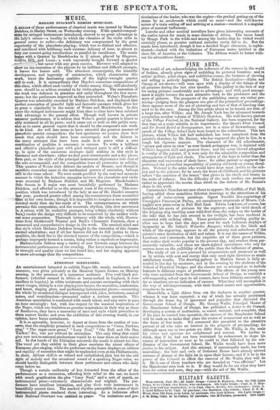MUSIC.
MADAME DULCKEN'S SOIREES MUSICALES.
A SERIES of three performances of classical music was opened by Madame Dulcken, in Harley Street, on Wednesday evening. If the quartet composi- tions for stringed instruments introduced, showed to no great advantage in the lady's saloon—a locality in which the vibration of the violin tribe in general seems to suffer—the deficiency was compensated by the great superiority of the pianoforte-playing; which was so distinct and effective, and combined with brilliancy such extreme delicacy of tone, as almost to defy our concert-going recollections to parallel its excellence. The music began with a Quartet by Mendelssohn in E minor, played by Blagrove, Goffrie, Hill_apd. Lucas; a work repeatedly brought forward at qinartet , but never with any great success. However well adapted to show on VIC execution of the players by its brilliant and difficult passages, it leaves the hearer cold. The abundant counterpoint, the scientific development, and ingenuity of construction, which characterize this work, leave the fascinating qualities of the highly-wrought quartet still to seek. It is extraordinary that Haydn's numerous compositions of this class, which afford such variety of choice among things still absolutely new, should be so seldom resorted to by violin-players The execution of the work was deficient in• precision and unity throughout the first move- ment; but the performers improved as they proceeded. Weber's Pianoforte Quartet was admirably executed by Madame Dulcken, and displayed that perfect conception of graceful light and fantastic passages which gives her so great a superiority in thamusic of Weber and Mendelssohn. In this piece the stringed instruments might from time to time have been subdued with advantage to the general effect. Though well known in private amateur performance, it is seldom that Weber's genial quartet is heard so ably sustained in all its parts; and it came out so well on this public occa- sion as to cause general regret that it should be the composer's sole work in its kind. An evil fate seems to have attended the greatest masters of pianoforte quartet composition: the best specimens we possess show how much that style should have been encouraged; and the failures in the many attempts that have been made in it prove what a rare combination of qualities is necessary to success. To write a brilliant and effective pianoforte part with good stringed parts is still a difficul- ty, in spite of the numerous attempts daily making in this style in Germany and elsewhere: either we find good counterpoint and a dry piano- forte part, or the style of the principal instrument degenerates into that of the solo accompanied, and the composition loses all pretension to solidity.
This quartet of Weber duly follows the models of Mozart; and though it sacrifices somewhat more to the mechanical powers of execution, belongs 'still to the same school. We were much gratified by the neat and accurate manner in which the imitative arpeggios between the pianoforte and violin were executed by Madame Dulcken and Mr. Blagrove. Mendelssohn's Solo Sonata in E major was most beautifully performed by Madame Dulcken, and afforded to us the greatest treat of the evening. This com- position, which was introduced by the lady at one of Mr. Dando's concerts last year, produced greater effect among the connoisseurs there assembled than at her own house; though it is impossible to imagine a more accurate musical study than she has made of it. The extemporaneous air which pervades this composition, and the uncertain rhythm, (the slow movement in A minor, with its recitative passages, being written absolutely without bars,) render the design very difficult to be conceived by the auditor with- out some preparation. Thorough intimacy with the whole, with illustra- tions from Beethoven's Sonatas and Bach's Chromatic Fantasia, show a connected and comprehensive design in the work. The musical mind and fine style which Madame Dulcken brought to the execution of this Sonata excited admiration; and if all her hearers did not do fall justice to these qualities, the fault lies in the elevated nature of the composition,—which is perhaps improperly termed a sonata, being rather a capriccio or impromptu. Mademoiselle Schloss sang a variety of new German songs between the instrumental performances of the evening. Her lower tones have improved in strength and quality since we last heard her; and her singing appeared to more advantage than the compositions.


























 Previous page
Previous page